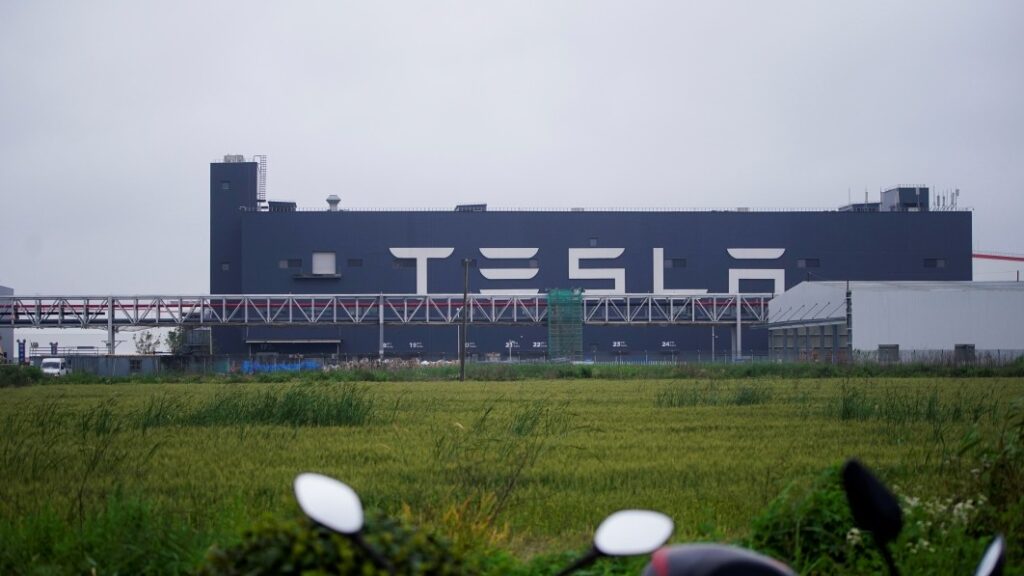Tesla’s new car-making process stokes debate among industry experts

Tesla Inc’s new vehicle-assembly system, which created instant buzz when it was unveiled in March, ignited a debate among auto manufacturing experts on whether CEO Elon Musk’s so-called “unboxed” process is radical, revisionist or derivative — or all of the above.
Musk believes the company needs to radically rethink conventional manufacturing methods in order to build more affordable — and profitable — electric vehicles in higher volumes.
Investors have been waiting for Tesla, the world’s most valuable automaker, to announce what is perceived as the company’s holy grail: An electric vehicle priced under $30,000. Right now, the least expensive Tesla starts at more than $40,000.
The unboxed assembly process is intended to enable Tesla to hit that ambitious price target.
One expert described the process as “revolutionary,” with the potential to upend the auto industry’s traditional moving assembly line. Others questioned whether a process that relies on previously tested techniques such as modular assembly can contribute to dramatically lower production costs.
When the new process was revealed at Tesla’s March 1 Investor Day, executives said it would make the company’s next-generation vehicles “significantly simpler and more affordable.”
Officials said the unboxed process could cut production costs in half and reduce the factory footprint by 40%. The aim, said the company, is to “build more vehicles at lower cost.”
The assemblage of new techniques will not be fully tested until the system is installed in late 2024 at Tesla’s new $5 billion plant in Monterrey, Mexico, where the company plans to build a new generation of sub-$30,000 EVs.
Several big questions loom: What sort of impact will Tesla’s process have on the auto industry overall? Will it render useless the widely copied Toyota Production System? And can Musk actually make his company’s process work as promised given Tesla’s history of missed production deadlines and failed attempts to deploy unproven technology?
Tesla did not immediately reply to requests for comment for this story.
Martin French, managing director at consulting firm Berylls which focuses on the industry’s rapid shift to electric and smart mobility, wondered if Tesla’s move might supplant decades-old lean manufacturing methods pioneered by industry kingpin Toyota Motor Corp.
“I got the feeling when I watched the Tesla (presentation) that the Toyota Production System handbook has just been thrown up in the air and machine-gunned down,” French said.
German researcher Jan-Philipp Büchler of the Free University of Dortmund, believes Tesla’s new process is “revolutionary,” adding: “This is much more than modular production … It’s eliminating steps that were standard, creating new patterns of working, increasing speed, reducing complexity.”
Tesla is still testing various elements of the system, including the use of large front and rear subassemblies built on single-piece underbody castings, which are then joined to a central structural battery pack. Body panels are painted separately, then joined together toward the end of the assembly process.
Building a vehicle in big chunks
Some manufacturing experts believe the unboxed process has the potential to reduce or eliminate familiar elements inside auto factories, including stamping, welding and painting unfinished car bodies and sending them down a long assembly line where seats, engines and other components are attached.
If everything works as planned, the unboxed process could rewrite the industry’s standard playbook and practices. But Tesla has often fallen short of its ambitious targets, from the oft-delayed Cybertruck to its still-unfinished “Full Self Driving” software.
Lean gurus like James Womack and Hide Oba see key differences between the Toyota production way and Tesla’s proposed overhaul.
At its core, the Tesla method “is an assembly process” while Toyota has developed a far broader and more comprehensive “production management system” that helps automakers run assembly processes and related operations more efficiently, said Womack, a professor at the Massachusetts Institute of Technology and co-author of “The Machine That Changed the World,” the 1990 book on Toyota’s lean production philosophy and methods.
A big risk cited by Oba, an independent lean-manufacturing consultant, is what he describes as the “rigidity” of the unboxed system. Oba worked previously for the Toyota Production System Support Center, a division that helps the automaker’s suppliers and others implement TPS.
The Tesla process “won’t work unless production of these big, high-content unboxed vehicle modules are completely synchronized, and finished blocks arrive for a final put-together just-in-time,” he said.
Another question is whether Tesla can produce multiple vehicle models of different sizes and body styles on the same production line with the unboxed system.
“My guess is that’s next to impossible,” Oba said. That is because the way Tesla has sliced or “unboxed” the vehicle into several big blocks is so radical, and the dimensions of those blocks do not appear to offer much room for manufacturing variables.
“That could become a drag on the company’s overall efficiency since Tesla’s model lineup is sure to become more varied and complex” in the future, he said.
Related video:







